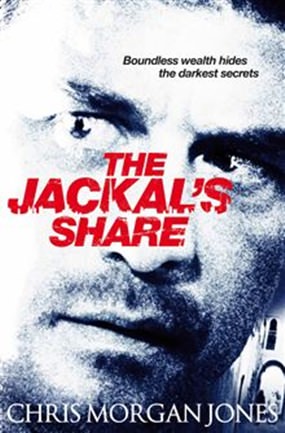When I saw this book on the Bookazine shelves I initially presumed it was about the infamous Venezuelan terrorist Ilich Ramírez Sánchez also known as Carlos the Jackal. But no, this book, The Jackal’s Share (ISBN 978-0-330-53255-6, Pan Books, 2013) by Chris Morgan Jones is not about Carlos, and is in fact the second spy thriller from this author. The first, An Agent of Deceit was given critical acclaim, and this one follows on with the same secret agent, Ben Webster, being one of the principal characters.
The book is divided into three parts, each leading the reader to even more closely follow the exploits of Ben Webster as he attempts to understand and unravel the history of the obscenely rich client (Darius Qazai) who has hired him to show that he has no hidden agenda or a murky past as Qazai is interested in selling his company to the Americans who will carry out due diligence checks. Having hired Webster’s company, which was not one of the leading entrepreneurs in the investigations field initially looked rather strange for one so rich, but by Part Three you begin to see why.

Set in and around the Middle East, and Iran in particular, Chris Morgan Jones leads you into a world that we are not conversant with since the Shah of Iran was deposed. However, some aspects of western culture remain – the subculture aspects!
Investment banking is not a subject which sits comfortably with me, but the reader is led through the making of a private banking facility and how private investors who wish to remain anonymous can do so with an ease that standard banking facilities cannot offer. From there, the money can take many different trails, so that the old adage “follow the money” becomes very difficult. And deliberately so. But it also becomes apparent that goodwill only lasts as long as the money trails remain hidden.
Strains of today’s reality are placed in the book, to raise it from pure fiction, to something that might just be truth, such as the introduction of Ahmadinejad, rejection of Sunni businesses and a hatred of the US, and the property market crash in Dubai.
Ben Webster is not portrayed as a super-hero, but as a very ordinary man with everyday problems, both family and ethically. How he deals with some of the problems can occasionally make the reader wince, but he exhibits real world angst. And at times a real world ineptitude.
In fact, the psychological portrayal of the major players in this book is what makes the entire book so relevant and acceptable in the eyes and mind of the reader. Inconsequential details are not presented as an attempt to inject ‘reality’, but understandable human emotions are given and presented by the characters in the book. Not always noble emotions, but do give form and substance to the characters.
This book is a world class thriller, and at B. 385 is a bargain read for its 370 pages. Put a weekend aside to digest this book. You will not regret it. One of the better books of 2014.




